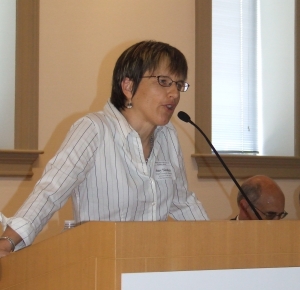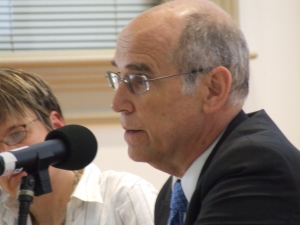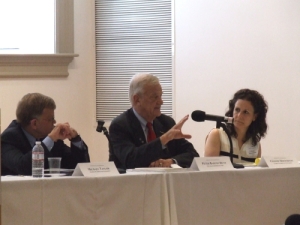Reforming OIRA: The Future of Regulatory Review
A Center for Progressive Reform Conference
On May 22, 2009, the Center for Progressive Reform gathered experts from across the policy spectrum to debate the future of regulatory review policy. The event, Reforming OIRA: The Future of Regulatory Review, was designed to contribute to the discussion on the Obama Administration's upcoming new executive order on regulatory review.
The symposium brought together many of the most prominent advocates and critics of the existing system of centralized review of individual rules using traditional cost-benefit analysis. Through a series of four panel-led discussions, the symposium examined and critiqued this system and evaluated possible options for reform.
Following are audio recordings of the discussions in mp3 format.
Introductory Remarks
-
Amy Sinden – Temple University and Board Member of CPR
Welcome
-
Robert Shull, Public Welfare Foundation

Panel One: Pragmatic Regulatory Impact Analysis
Pragmatic Regulatory Impact Analysis (PRIA) was introduced as an approach that sought to tie regulatory decision-making closely to whatever statute is being implemented and to allow for a full and open consideration of all relevant quantitative and qualitative factors. Much of the debate in the panel centered on whether and how PRIA differs from current practice, and to the extent that it did differ, whether it offered a systematic approach that could avoid arbitrary decision-making.
-
Complete Panel One with Intros and Q/A (39 meg file)
- Amy Sinden – Temple University and Board Member of CPR (Moderator)
- Christopher Schroeder – Duke University and then-Member Scholar of CPR
- Frank Ackerman – Tufts University and Member Scholar of CPR
- Richard Pierce – George Washington University
- Donald Arbuckle – University of Texas, Dallas
- Q/A for Panel One
Panel Two: Centralized Regulatory Review
Two: Centralized Regulatory Review
The panel began by exploring the role that centralized regulatory review plays in the U.S. regulatory system. The panel debated whether this role is inherently anti-regulatory or whether the impact it has on the regulatory system is a function of the incumbent Presidential Administration. The panelists debated the wisdom of some of CPR’s proposals for redesigning OIRA’s function to be more supportive of regulatory action, particularly the proposal to help agencies develop proactive regulatory agendas.
-
Complete Panel Two with Intros and Q/A (42.5 meg)
- David Vladeck – Georgetown University and Member Scholar of CPR (Moderator)
- Curtis Copeland – Congressional Research Service
- Adam Finkel – University of Pennsylvania/Rutgers University
- William Funk – Lewis & Clark Law School and Member Scholar of CPR
- Sally Katzen – University of Michigan
- Paul Noe – American Forest & Paper
- Q/A for Panel Two
Panel Three: Problems with Cost-Benefit Analysis
 The panelists generally agreed that cost-benefit analysis was not immune from criticism. The question that commanded most of the panel discussion was whether the criticisms of cost-benefit analysis were fatal, and thus justified jettisoning the regulatory impact analysis methodology once and for all. The panelists evaluated different proposals for improving cost-benefit analysis to determine whether they would be sound in theory as well as in practice.
The panelists generally agreed that cost-benefit analysis was not immune from criticism. The question that commanded most of the panel discussion was whether the criticisms of cost-benefit analysis were fatal, and thus justified jettisoning the regulatory impact analysis methodology once and for all. The panelists evaluated different proposals for improving cost-benefit analysis to determine whether they would be sound in theory as well as in practice.
- Wendy Wagner - University of Texas and Member Scholar of CPR (Moderator)
- David Driesen – Syracuse University and Member Scholar of CPR
- Thomas McGarity – University of Texas and Board Member of CPR
- Richard Revesz – New York University
- Robert Hahn – American Enterprise Institute
- Q/A for Panel Three
Panel Four: The State of the Agencies

This panel examined the obstacles faced by two important regulatory agencies—the FDA and OSHA—as they attempt to fulfill their statutory missions of protecting people. All of the panelists agreed that one of the leading obstacles for these agencies is insufficient monetary and human resources. At FDA the lack of resources forces the agency to react to crises rather than taking preventative measures, whereas at OSHA the lack of resources has produced a huge backlog in terms of taking regulatory action on significant workplace threats.
-
Complete Panel Four with Intros and Q/A
- Rena Steinzor – University of Maryland and President of CPR (Moderator)
- Michael Taylor – George Washington University
- Peter Barton Hutt – Covington & Burling
- Celeste Monforton – George Washington University
- Q/A for Panel Four
